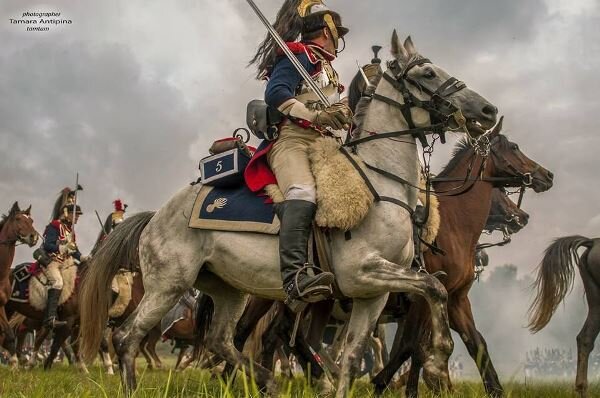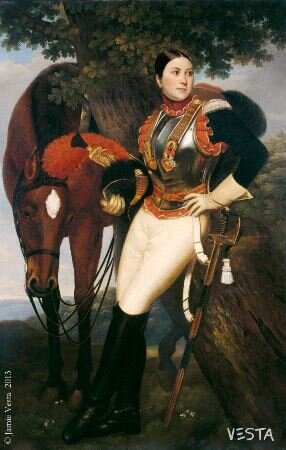Marie-Therese Figueur
Marie-Thérèse Figueur was a 22 year-veteran of twenty military campaigns during the Wars of Napoleon and the Wars of the French Revolution, survived being shot twice, slashed four times with sabers, had at least four horses shot out from under her, and was taken as a Prisoner of War three times – the first time her captors liked her so much they tried to recruit her, the second time she fought her way out and escaped from an Austrian prison, and the third time they transferred her to house arrest England for a year and all she really mentions in her memoirs about it is that British food sucks but their beer is admittedly pretty decent. Known as le petit Sans-Gene, meaning "the little unconstrained one", she stood just five-foot-four inches tall (1.6m), could swear like a motherfucking Lil' Wayne album, threatened to murder pretty much anyone who looked at her sideways, and brushed off her cavalry unit's role in one of the greatest and most dominating tactical military victories of all time by simply saying, "I did my little part in the great concert that we gave on the plains of Jena to those gentlemen the Prussians."
Oh, yeah, also she was a woman, enlisted legally in the military in 1793, never once made any effort to conceal her gender, and still wound up on the front lines of nearly every major combat of the Napoleonic Era and retired with an NCO's pension.
Dragoon Figueur was born near Dijon, France in January of 1774. She was orphaned by age nine, and went to live with her uncle, who was a cavalry officer in the army of Louis XVI. Even from an early age, this girl was trouble, and at one point her uncle was about to fight a duel with a rival of his, but when the two men went out to the field to settle shit like men she showed up, drew her uncle's saber instead, and threatened to fight the duel herself to defend her family honor. Both soldiers were so impressed with her huge brass balls that they decided, fuck it, and didn't have the duel.
Ok, so in 1793 shit went fucky in France, as the French Revolution overthrew the monarchs, sliced off their heads with a giant pizza wheel, and then started running around saying all this crazy shit about how government heads-of-state shouldn't be determined by which inbred Hapsburg cousin happened to be born in your home country. Naturally, Figueur and her uncle had to put an end to that insanity, so they joined the Royalist army and rode to war against the Revolution.
The Royalists were defeated, and in the battle Figueur was knocked from her horse and captured by the revolutionaries. The commander of the Revolutionary force later wrote that she fought to the end, and was "shrieking that we were a pack of cowards" as she was being taken prisoner.
Later that night, when being interrogated by her captors, she is quoted as saying, "You talk of scum. I am of the opinion that the scum are those who fight against their own country. I am speaking to you, though but a woman – if one of you will lend me a sabre, I will undertake to bring the least cowardly among you to reason in a very short while."
The Revolutionaries were like, you know what? This chick is pretty rad. So they gave her two options – join the Revolutionary Army, or get ready to meet the "national razor" (the French nickname for the guillotine and/or that's what she said).
She joined up.
So in 1793, nineteen year-old Therese Figueur enlisted in the French Revolutionary cavalry. At the time, it was the height of the Revolution, which had some really forward-thinking attitudes towards women's rights, and it was uncommon but not SUPER weird to have women soldiers – we know that there were at least 80 women who fought for the French Army around this time. She never had to do the "dress up as a man and take a fake name" thing that you see from a lot of women soldiers fighting wars in Early Modern Europe, and by all accounts her skill at horsemanship, firearms, swordfighting, and cursing were pretty legendary even among her fellow cavalrymen. Known as Madam Sans-Gene, which I did hilariously see translated in one place as "Ms. Without Embarassment", she would now embark on a 20-year career smashing skulls from the Pyrenees to Berlin and everywhere in between.
Her first encounter with Napoleon Bonaparte came a bit later in 1793, when she was dispatched to the Siege of Toulon. Napoleon was an artillery commander at the time, and she would fight outside the gates alongside the future Emperor of France. She battled hard, but was shot in the chest by a British rifleman and seriously wounded during the fighting.
This, of course, did not keep her down. She was back in action just a few months later.
When the Jacobin "Reign of Terror" took over France, they rescinded the whole Women in Combat thing, but Figueur's commanding officers filed a petition for her to remain in the Army – they cited heroism at Toulon, and later in combat against the Spanish in the Pyrenees, and Figueur was granted a special dispensation to remain in the French Army. She had two horses killed out from under her during brutal battles across the Pyrenees Mountains with the Spaniards, and was cited for heroism again, this time for riding to the rescue of Jean-Francois Nogues – a French General who would later become a prominent politician and the aide-de-camp to Napoleon's brother. Figueur, seeing the officer in trouble, cut a swath of destruction to him, dragged the man to safety, and then immediately rode back into the fray. General Nogues promoted her to Corporal for her actions, but she declined the promotion because fuckin' whatever, dude.
Figueur ended up marrying one of the soldiers in her unit not too long after this, but when she re-upped for another tour of duty in 1798 she didn't sign up with his last name – instead she registered as Therese Sansgene, because why not just lean the fuck in to that whole Mrs. Unconstrained thing.
In 1798 she joined the Fifteenth Dragoons, the unit that formed the spearhead of the French Army that said "fuck your neutrality", invaded Switzerland, defeated their armies, and installed a puppet government loyal to Napoleon. A year later she was in Northern Italy, battling the Austrians in several engagements that raged across the Alps. At the Battle of Genola, outnumbered two-to-one, Figueur and the 15th Dragoons crashed into a hardcore melee with the Austrian cavalry. In the brutal hand-to-hand fighting that ensued, Figueur was slashed four times with sabers, had her horse shot out from under her, and was only taken prisoner after she passed out from blood loss. She was brought to an Austrian prisoner-of-war camp, but French royalists helped her escape and she ran on foot through the Alps to make it back to friendly lines.
Figueur returned home to recover (since, you know, she'd been thrown from a horse and suffered multiple stab wounds), and eventually her injuries forced her to retire from the military. She was given an NCO's pension, 24 Francs per month, and was given awards for bravery by two Marshals of France and recommended for the Legion of Honor.
Her retirement lasted a year before she got bored of that shit and re-enlisted to get back into the action.
Therese Figueur rejoined the Grand Armee in 1802. She was given a job working as an assistant to Napoleon's wife Josephine, but that shit was so boring that she quit after ten days and requested to be transferred to a combat role. Josephine was happy to facilitate this, especially on account of how Figueur had a bad tendency to beat up people who disagreed with her, even when that wasn't really the most diplomatic option.
So she was sent to Germany and hurled into the Austerlitz campaign, where Napoleon engaged the combined might of the Emperors of Prussia, Austria, and Russia all at the same time, stomped the balls of all three of them, and then shot them in the back as they were running away.
Figueur barely mentions being at Austerlitz, Ulm, or Jena-Auerstadt, as though one of the most brilliant military campaigns ever undertaken was NBD and that conquering Germany was just another Tuesday afternoon, but, then again, that's how a True Badass would describe that stuff anyways so it all kinda tracks. She was wounded again, shot during a skirmish near Linz while traveling on the road to Berlin, but it's not like that sort of thing really seems to bother her either, and by 1809 she was a dragoon in the French Imperial Guard – the most elite and badass unit in Napoleon's army.
Figueur fought against guerillas in Spain for three years, but was eventually captured by the Spanish guerilla Merino in 1812. His men wanted to execute her, but the locals of the city actually stopped them – they told stories of how this woman had been kind to the people, donated money to the poor, and used to care for stray dogs, and stories of her kind heart convinced Merino to spare her life. Instead he offered her to the British as a POW, and they sent her back to the UK to serve under house arrest for a year or so. She hated the food but liked the beer, which, honestly, I get it. She returned to France in 1815 and re-joined Napoleon for the Hundred Days, but wasn't present for Waterloo. She was engaged again in some fighting around Paris near the bitter end of Napoleon's reign, but ultimately her tenure as a soldier ended with the fall of L'Empereur.
Marie-Therese Figueur retired to Paris after a 20-year career in the French military, where she opened a fine-dining restaurant with a woman named Jeanne Garnerin, who was famous for being the first woman to ever use a parachute. Garnerin's husband had invented the parachute, and she was not only the first woman to use one, but she was also the first woman to ascend solo above 3,000 feet in a hot air balloon, and she had completed nearly 40 jumps and was already world-famous for her exploits by this time. They ran their restaurant, Figueur wrote her autobiography, lived a long and happy life, and eventually passed away as a national hero in 1861 at the age of 86. She remains one of the great women soldiers in military history.
Links:
Books:
Clayton, Ellen C. Female Warriors. Outlook Verlag, 2018.
Figueur, Thérèse. Les campagnes de Mademoiselle Thérèse Figueur. France: Dauvin et Fontaine, 1842.
Vandam, Albert D. "The Real Madame Sans-Gene". The New Review. Vol. 11. United Kingdom: Longmans, Green, 1894.
Wheelwright, Julie. Sisters in Arms. United Kingdom: Bloomsbury Publishing, 2020.







